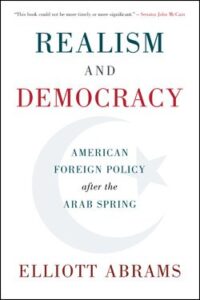A “remarkable” amount of disorganization mars U.S. democracy and human rights efforts, according to a leading observer. Better organization and coordination, including regular meetings of key officials from State, USAID, NED, et al, to discuss individual country programming could increase efficacy, says Elliott Abrams, senior fellow for Middle Eastern studies at the Council on Foreign Relations (CFR).
 One related problem is that many democracy programs are not run by non-profit NGOs such as the National Endowment for Democracy (NED) or Freedom House, he observes. A strikingly high percentage are implemented by for-profit corporations that specialize in winning such government contracts, which is a problem for two reasons, and the first is cost: profits eat up funds that should be going to the promotion of human rights and democracy. But the second problem may be even more significant: what has been called “tameness.” For-profit private companies are good at winning contracts and supplying bureaucrats with the documentation they need, because their main goal is to stay in business. They will be leery of activities that could get them expelled from a country and will avoid confrontational activities that promoting democracy and human rights may require.
One related problem is that many democracy programs are not run by non-profit NGOs such as the National Endowment for Democracy (NED) or Freedom House, he observes. A strikingly high percentage are implemented by for-profit corporations that specialize in winning such government contracts, which is a problem for two reasons, and the first is cost: profits eat up funds that should be going to the promotion of human rights and democracy. But the second problem may be even more significant: what has been called “tameness.” For-profit private companies are good at winning contracts and supplying bureaucrats with the documentation they need, because their main goal is to stay in business. They will be leery of activities that could get them expelled from a country and will avoid confrontational activities that promoting democracy and human rights may require.
 U.S. official programming to promote democracy and human rights would benefit from at least two changes, given these problems, the author of Realism and Democracy adds in a contribution to the Diamonstein-Spielvogel Project on the Future of Democracy:
U.S. official programming to promote democracy and human rights would benefit from at least two changes, given these problems, the author of Realism and Democracy adds in a contribution to the Diamonstein-Spielvogel Project on the Future of Democracy:
- First, it should not be a business. The percentage of programs, and often of the largest programs, run by private corporations is too high. Discussions with many NGO officials suggest that they could do more, if the U.S. government adopted a policy of moving away from for-profit companies to doing its own programming and using NGOs. This is not a panacea; NGOs too have their own interests, and there is a danger that they become too dependent on government grants. But relying on NGOs and individuals dedicated to the cause would be an improvement over having DRG programs become a profit center.
- Second, there should be a serious effort at coordination. There should be regular meetings of the key officials—for example, from State, USAID, NED, MCC, and USIP—to discuss individual country programming. A sufficiently high official at the National Security Council should be empowered to act as a coordinator (though without the budget authority that the Director of National Intelligence holds), especially in an administration that claims human rights are at the center of its foreign policy.
- Third, there should be a unified budget for promotion of democracy and human rights. This does not mean trying the impossible—eliminating congressional committee jurisdictions and government agency control over their own budgets. But each year the Office of Management and Budget should publish a document stating, and detailing, U.S. government spending for democracy and human rights.







